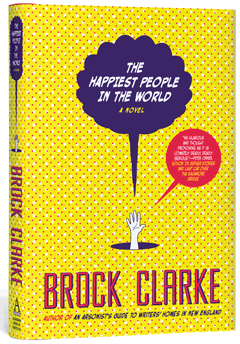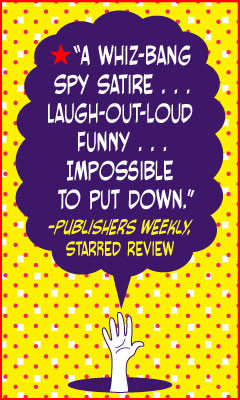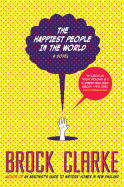The Happiest People in the World
by Brock Clarke
In a madcap, international adventure, Brock Clarke, author of An Arsonist's Guide to Writers' Homes in New England, asks what would happen if one of the happiest people in the world--a Dane--was forced to flee Denmark and reinvent himself in a small town in upstate New York. Clarke's answer will make readers laugh, scratch their heads and maybe even investigate their high school guidance counselors a bit more closely.
Following the 2005 strife involving political cartoons of the Islamic prophet Muhammad printed in the Danish newspaper Jyllands-Posten, cartoonist Jens Baedrup receives an assignment from his editor at the Optimist, a small weekly paper in Skagen, Denmark. "Draw a cartoon depicting in some way or other the controversy." A naturally positive man with no strong feelings about the controversy, Jens isn't sure if drawing this cartoon is such a good idea. But ultimately he decides it is his job and everything will be just fine. He is mistaken.
Two Danish Muslim teenagers happen upon Jens's cartoon in a discarded copy of the newspaper. They are angry about the drawing and feel insulted by Jens and the Optimist. Their answer is to burn the newspaper office and Jens's home, "Though their anger hadn't made it clear to them that when burning down occupied buildings, killing someone [is] always a possibility."
The Danish Security and Intelligence Service decides to make that possibility a reality and, for his safety, Jens Baedrup is declared dead in the house fire. He bounces around Europe for a few years with a minder and then Locs, the agent assigned to him, decides--contrary to her superior's orders--to send Jens to Broomeville, N.Y. What the agent doesn't tell Jens is that Broomeville is the city she fled when her lover, the town's high school principal, left her to stay with his wife. Seeing a way to reconnect, she calls on him to give Jens a job. Thus, Jens becomes Henrik "Henry" Larsen, a high school guidance counselor.
As Henry settles into his role as school guidance counselor, he learns the idiosyncratic characteristics of American life: "...that American sports talk radio announcers liked to say about something, 'There's no doubt about it,' before then expressing their many doubts about it; that American political commentators liked to preface their comments by saying, 'No offense,' before then saying something offensive... that Americans were very impatient people with very short attention spans; that Americans believed as long as they were inside their trucks they were invisible... and that in general Americans thought their trucks were magic."
The new guidance counselor's appearance in Broomeville is the first in a series of events that shake up the sleepy little backwoods town. Soon after his arrival, Henry's predecessor dies from what the coroner is calling a self-inflicted gunshot wound even though her brother denies she was suicidal. Henry falls in love with Ellen, the principal's wife. And finally, a mysterious Dane, Søren, shows up looking for Jens Baedrup. Meanwhile, unbeknownst to most of the town, a CIA training school is recruiting the young outcasts of Broomeville, who meet regularly at the town diner.
In Skagen, Muslim teenagers drop a literal match on the gasoline that ignites Jens's home and destroys his life. In Broomeville, Clarke flicks a figurative match at the accelerants--a questionable suicide, a volatile marriage, a stranger and spooks--priming the town. Not only has Clarke relocated his happy Dane, he's given him flames to juggle but no juggling lessons. The result can only be spectacular.
The Happiest People in the World is a wacky spy novel full of ingenious commentary devices. Pithy statements throughout--"You miss a lot when you spent so much time looking through binoculars"--offer up insightful advice as well as thematic acumen. Clarke isn't wasteful in words, imagery or plot devices. Down to the smile or frown on Jens's face and the clocks on Doc's diner wall, every detail plays a significant role.
Cultural differences come into play when the Danes can't fathom committing a murder with a gun or the Americans can't easily buy one in Denmark, when the Danes won't rent a car over taking mass transit because of wastefulness, and most especially when there are communication barriers. But Clarke illustrates just as clearly that communication missteps or omissions between people sharing the same language and culture can destroy families, friendships, businesses. If communication doesn't work, nothing works.
The espionage format is the vehicle that provides an element of suspense and a swift plot pace, but readers are more likely to anticipate the characters' next debacle rather than their next crime. In other words, think Maxwell Smart rather than James Bond.
The Happiest People in the World isn't a book that easily fits into a neat marketing category but it does offer plenty to appreciate--a little happiness for all kinds of readers in the world. --Jen Forbus








_Selby_Frame.jpg)